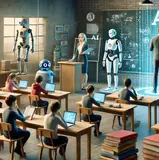The Future of Learning: AI and Human Potential

Artificial Intelligence is now dominating many conversations around the future of education, and it could indeed impact how students learn and how they prepare for adulthood. If students become overly reliant on AI for tasks like writing or problem-solving, they may not develop the critical thinking skills needed for success. AI tools can generate content quickly, but can also stifle creativity and originality in students; these very tools could also perpetuate biases and misinformation, which teachers will need to address. AI, on a larger scale, is automating many tasks, and students will have to develop skills that are not easily replicable by AI, such as complex problem-solving, critical thinking, and creativity.
While AI can be a powerful tool for learning, teachers are now obligated to be aware of its potential drawbacks and help students use it responsibly.
Will AI destroy education, as some may suggest? Will it give students a way to completely opt out of creative thinking and problem-solving?
Leon Furze argues, in “AI and Skills Loss: It’s Not That Simple,” that fearing AI-caused skill loss is a misguided reaction. While AI will replace some skills, like map reading or using a calculator, focusing on this perceived loss misses the bigger picture. Furze says that the "AI = Skills Loss" argument is flawed, and that it diminishes both teachers and students by assuming that teachers just deliver facts, and that students are just lazy. Technology always replaces skills. Just like writing replaced memorization in classrooms, AI will replace some existing skills. Furze encourages us to focus on why skills matter, not just the skill itself. Education should focus on deeper goals. Do we value map reading because it teaches critical thinking, or because it gets us places? Is education about becoming a well-rounded person, or useful to the economy? Furze reminds us that learning goes beyond classrooms, and it always has. Many skills, like writing, are developed outside of school, so teachers should actually embrace AI as a tool. They can use AI for writing assistance instead of fearing that it will replace writing skills.
This article reflects one perspective on the AI debate: that fearing skill loss because of AI is short-sighted. Instead, Furze argues that we should have a nuanced discussion about the true purpose of education and how AI can be used to enhance learning.